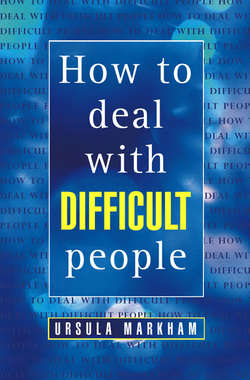How to Deal With Difficult People

Реклама. ООО «ЛитРес», ИНН: 7719571260.
Оглавление
Ursula Markham. How to Deal With Difficult People
How to Deal with Difficult People. Ursula Markham
Table of Contents
Introduction
CHAPTER ONE Understanding Yourself and Others
How Do You React?
Do You Really Want to Be Controlled by Others?
What Is Your Reaction When Confronted by Someone Who Is Furious with You?
Do You Talk Yourself into a State of Negativity?
How Do You Respond to Criticism?
Do You Have a Permanently Negative Outlook?
Do You Swallow Your Feelings – Both Good and Bad?
Know Your Personality Type
Type A Personality
Type B Personality
Why Are You as You Are?
What Can You Do?
Success vs. Failure
Making a ‘Like-List’
CHAPTER TWO Styles of Behaviour
The Aggressive Person
Verbal Language: The Aggressive Person Will Say Things Like:
Body Language
The Submissive Person
Verbal Language
Body Language
The Assertive Person
Verbal Language
Body Language
Becoming More Assertive
Giving and Receiving Compliments
Making Changes
Communication
Negotiation
Handling Put-downs
Dealing with Criticism
Preparation
CHAPTER THREE Types of Problem People
Janet
Dealing with a Janet
Arnold
Dealing with an Arnold
Helen
Dealing with a Helen
Stuart
Dealing with a Stuart
Michelle
Dealing with a Michelle
Rachel and Robert (Ponderers)
Dealing with a Rachel
Dealing with a Robert
Daphne
Dealing with a Daphne
George
Dealing with a George
Sheila
Dealing with a Sheila
Eric and Marcia (Know-alls)
Dealing with an Eric
Dealing with a Marcia
Geoff
Dealing with a Geoff
CHAPTER FOUR Handling Conflict
Conflicting Personalities
The Processor
The Dictator
The Enthuser
The Empathizer
Conflict and Stress
CHAPTER FIVE Communicating Effectively
Transmitting the Message
Listening Skills
Paraphrasing
Feedback
Receiving Feedback
Active Listening
How to Be an Active Listener
Effective Speaking
The ‘Stuck Record’ Technique
Body Language
Aggressive body language:
Submissive body language:
Assertive or responsive body language:
Mirroring
Handshakes
CHAPTER SIX Saying No
A Step-by-step Guide to Saying No
Why Is It So Hard to Say No? Lack of Self-esteem
Negative Self-image
Guilt
The Need to Be Liked
CHAPTER SEVEN Dealing with Complaints
What to Do With a Complainer
Checklist for Handling Complaints
Telephone Complaints
CHAPTER EIGHT Coping with Authority
Aggressive Authority Figures
Are You Being Kept ‘in Your Place’?
Do You Never Receive Recognition?
Verbal Aggression
Sarcasm
Criticism
Rages
Silence
Put-downs
The Disorganized Authority Figure
Conflicting Authority Figures
Non-supportive Authority Figures
Sexual Harassment
CHAPTER NINE Being in Authority
Delegation
Training
Motivation
Leadership
The Commander
The Instigator
The Negotiator
Difficulties a Leader May Face
Those with Potential Behaviour or Attitude Problems
Why?
What to Do
Those Who Do Not Like Change
Why?
What to Do
Those Who Hold Things Up
Why?
What to Do
Time-wasters
Why?
What to Do
Those Who Are Absent More than Seems Appropriate
Why?
What to Do
Those with Prejudices Against You
Why?
What to Do
Those Who Repeatedly Make Errors
Why?
What to Do
People Who Are Excessively Untidy
Why?
What to Do
Personality Conflicts
Why?
What to Do
CHAPTER TEN Step-by-Step Guide to Dealing with Difficult People. Understanding Yourself and Others
Styles of Behaviour
The Aggressive Person
The Submissive Person
The Assertive Person
Types of Problem People
What to Do
What to Do
What to Do
What to Do
What to Do
What to Do
What to Do
What to Do
What to Do
What to Do
What to Do
What to Do
Handling Conflict
The Processor
The Dictator
The Enthuser
The Empathizer
Communicating Effectively
Body language
Saying No
Why You Might Find Saying No Difficult
Dealing with Complaints
Coping with Authority
Aggressive Verbal Tactics
Sexual Harassment
Dealing with Harassment
Being in Authority. A Good Leader Can
The Commander
The Instigator
The Negotiator
Difficulties a Leader May Face
Further Reading and Resources. Further Reading
Self-help
Index
About the Author
By the same author:
Copyright
About the Publisher
Отрывок из книги
To my family – with all my love
Title Page
.....
The first people with whom you formed any kind of relationship were your mother and father (or those who stood in that position). From their attitude towards you and their opinion you will have formed a view about yourself and your ‘value’. Some parents, of course, are deliberately unkind to their children, inflicting mental, physical or emotional damage. Fortunately, however, such parents make up only a small minority. But it is all too possible for the kindest and most well-meaning of adults to inflict harm, too – although they would probably be shocked if they knew they had done so. Those who are over-protective, doing everything for their child and fighting all his battles, may create an adult who has learned to be so dependent that he is quite unable to stand on his own feet. Those who care and provide for their children but find it difficult to be demonstrative (possibly due to defects in their own upbringing) may cause those children to believe that they are unworthy of love and affection – unlovable in fact.
A small child will think that his parents know everything and are perfect in every way. If one or both of those parents does not show love and affection, the child will form the inner belief that he is unworthy of such love and his self-esteem will develop (or not) accordingly. Similarly, the adult who thinks he will spur his child on by telling him that he is ‘stupid’ or ‘could do much better’ will, in fact, demolish the poor child’s belief in himself and his abilities until he either refuses to try or sets about everything in so half-hearted a fashion that he is bound to fail – thereby reinforcing the already negative self-image.
.....